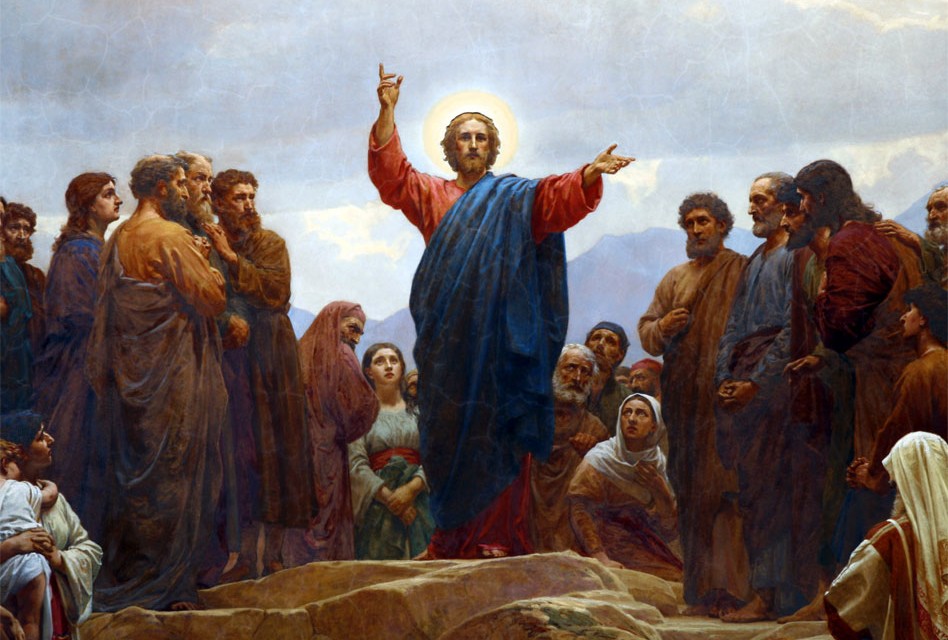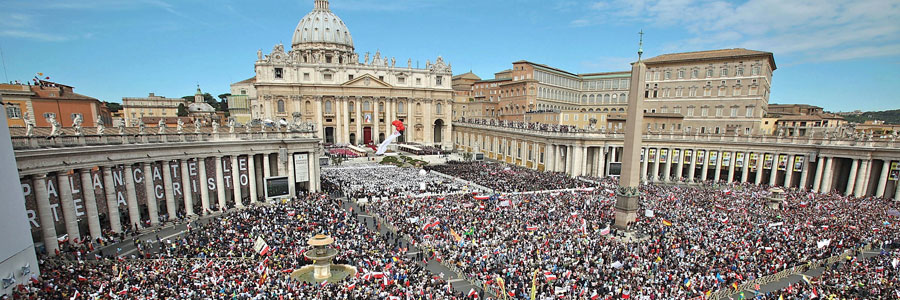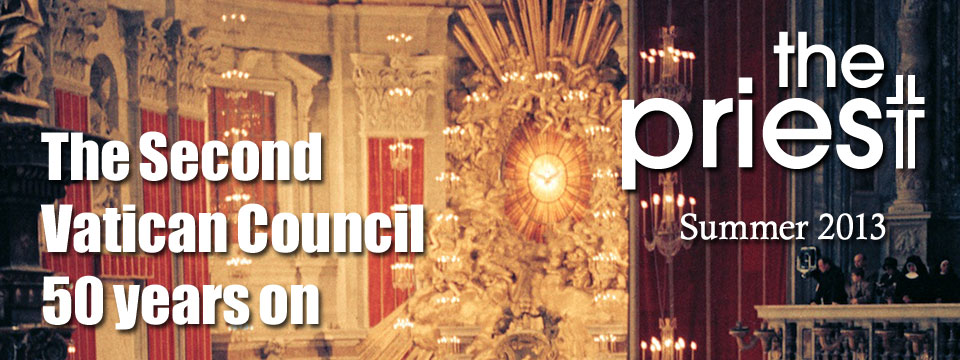My brothers, we are all deeply aware that we are moving through a time in our society where its Christian underpinnings are increasingly being removed. We know that many even among our Catholic people no longer have a Christian mind. Many who would consider themselves Catholic have been shaped by the spirit of the world. This is currently very evident in the debate about changing the definition of marriage.
We lament the loss of Christian culture which we love so much. We are saddened that many young people see no relevance in the sacramental life of the Church. We are pained by criticism and negativity directed towards the Church. We are finding ourselves increasingly outsiders in our society.
This very real experience causes us to examine ourselves in the search for what can be done to arrest these changes. We find ourselves so often seemingly powerless.
We can be tempted to retreat into the safety of a small coterie of like-minded Catholics, clerical and lay. We can be attracted by the desire to live cut off from the crowd and enjoying the beauty and nobility of our Catholic culture of liturgy, music and the arts. We can seek to hide away in a safe place.
We know we cannot do this, attractive as it appears. We know our Master expects us to engage with the society. We are to be heralds of the truth. We are to be instruments of divine grace. We are to be in the public square proclaiming the faith.
Print Friendly Format
Download and view this article as it appeared in the Summer 2015 issue of The Priest.
Back to basics
This moment in history requires us to returns to the basics of our faith. As its cultural elements are being stripped away we are being laid bare. What remains is the essence of what it means to be a Catholic.
In our preaching and teaching as priests we are discovering that we need to return to the basics. We cannot presume any more what we once presumed. We cannot expect that the average Catholic with whom we engage in our pastoral ministry shares a level of faith that enables fruitful catechesis.
We are finding ourselves back at the beginnings – disciples of our Lord Jesus Christ amidst a vast unbelieving throng. Our ministry, our message, is now to the unbeliever, even if previously baptised.
Brothers, I would propose to you that we priests of the early twenty-first century need to embrace the spirituality of the Kerygma, so that we can become effective proclaimers of Christ to the world. As we more fully live the Kerygma we will be more effective agents of the Kerygma, and I believe it will become a path to personal holiness.
A question
It begs a question: what is the Kerygma? I am sure we can all answer it. However let us explore it together.
One way in which we could frame the question (something I like to do) is to ask: “In ten words or less what is the message that the Church offers to the world?”
I find I get a wide variety of answers to this question, most of which hinge on the word “love.”
What is the message of the Church to the world? I would like to turn to the New Testament. What does the New Testament say about the Kerygma? As a preliminary step I would like to consider the message of St John the Baptist.
The message of John the Baptist
What was the message of John the Baptist? This is very easy to answer. John the Baptist saw his role as preparing for the coming of the Messiah. He was secondary to the one who was to come after him whose sandal strap he was not fit to untie. His message was a call to repentance: “Turn away from your sins.” He urged his listeners to give expression to this intention by being baptised in the River Jordan. He is known as John “the Baptiser.” This was a symbolic means of being cleansed from their previous way of life and an indication that they would now live a new life.
His message was a message very typical of that of the prophets in Israel. John the Baptist was a fearless preacher, at one time calling the Pharisees listening to him a “brood of vipers.” He had a certain apocalyptic edge to his preaching as he urged people to turn from the “wrath to come.”
He said that people must prove the sincerity of their baptism by their improved way of life. He said that people who had two tunics should give one away; he told tax collectors only to collect what is just; he told soldiers to be content with their pay.
The reason for the urgency of his preaching was that the people needed to be ready to recognised and respond to the One who was coming after him. He saw that he was to prepare a way for the Lord. John the Baptist wanted people’s hearts to be open to receive the Messiah when he comes.
Thus, we can summarise the message of John the Baptist as urging people to prepare for the coming of the Messiah by an act of repentance.
The preaching of Jesus
Now, let us move forward. Once again I repeat the question: “In ten words or less what is the essential message of the preaching of Jesus?”
The best place to turn to is to look at how the Gospels present the Lord’s opening message as he began his public ministry. We are told by St Mark that after John was put in prison, Jesus went into Galilee and began preaching:
The time is fulfilled, and the kingdom of God is at hand; repent, and believe in the gospel. (Mk 1:14-15)
St Matthew records a similar message:
Repent, for the kingdom of heaven is at hand. (Mt 4:17)
Allow me to consider briefly the elements to this message. Firstly, Jesus announces that the “time is fulfilled.” This is the definitive moment in history; it is the moment of God’s action. We understand this in terms of the Incarnation, God has entered human history: Emmanuel – God is with us.
Secondly, Jesus declares that the “kingdom of God is at hand.” This needs some closer consideration. It is worth noting that St Luke records the same message when Jesus sends out his disciples:
“Whenever you enter a town and they receive you, eat what is set before you; heal the sick in it and say to them: ‘The kingdom of God has come near to you.’” (Lk 10:8)
The Kingdom
Chapter 13 of St Matthew’s Gospel contains a series of parables of the Lord on the subject of the Kingdom of Heaven. They tend to begin with the words, “the Kingdom of Heaven is like…” The parables use a number of images to describe the Kingdom: seed being sown; leaven in bread; a treasure in a field.
When asked by his disciples why he resorts to the use of parables when speaking to the crowds, the Lord explains simply that people do not understand what he is talking about and so, if you like, he uses a series of images to explain things. Even today the teaching of Jesus about the Kingdom of Heaven is difficult for many to understand. What is this ‘Kingdom’ to which the Lord is referring?
We know it is not an earthly reign – it is not a political kingdom. He taught clearly that this Kingdom is not of this world (see Jn 18:36). The Kingdom is not a physical but a spiritual reality. What does he mean when he says that it is close at hand? He is not simply speaking about heaven as our final destination. He says in another place that the Kingdom is “in the midst of you.” (Lk 17:21) In other words we are to live within this Kingdom now, here on earth.
The Lord describes Satan as the prince of this world (see Jn 12:31). In other words, the powers of evil influence world events. Jesus makes it abundantly clear that now God has acted and has entered human history through his Son to reverse this situation (see Jn 16:33). God’s kingdom is going to supplant the influence of Satan over the world.
Another translation of the term that is sometimes used is the “reign of God.” In other words, it is the exercise of the authority and power of God over the world, or more particularly, over our lives. This Kingdom of which the Lord speaks refers to the invitation of God through Christ to place one’s life under the authority and power of God.
The Kingdom of Heaven is a spiritual reality. It is accessed through faith. Jesus in one place described himself as the gate of the sheepfold – another image. (Jn 10:7) Faith in Christ is the door (or gate) through which we enter the Kingdom of Heaven. We could add that the greater our faith, the further we participate in the Kingdom of Heaven. What then happens is that we have oriented our lives around spiritual realities. This idea is developed by St Teresa of Avila in her Interior Castle.
In this way we enable the power, the protection and the very life of God to flow through us – like having leaven kneaded through the flour so that it causes it to rise. It is like allowing a seed to be planted in our hearts – a seed which will germinate and produce much fruitfulness.
Returning to the initial proclamation of Jesus, we might notice that Jesus proposes the way to respond to his message: repent and believe. In other words, turn from a life oriented away from God and embrace a new life in God through faith. As we saw, faith is the key to entry into the Kingdom of God.
This, then, is the message that lies at the heart of the preaching of Jesus. I would like now to consider the message of the Church.
The proclamation of the Church
Once again we can ask the same question: “In ten words or less what is the proclamation of the Church?”
To answer this question let us turn to the preaching of St Peter at Pentecost. What was the essence of his proclamation?
If we were to go the heart of his message we could summarise it as: “People of Jerusalem this man Jesus whom you crucified has risen from the dead, and he is both Lord and Christ.” (See Acts 2:22-24; 36)
We immediately become aware of a significant change in focus. This preaching is not about the Kingdom but about Christ himself. As we commented earlier, Christ is the one who has brought about the coming of the Kingdom – ultimately by his death and resurrection – and now entry into the new life of the Kingdom is through personal faith in him.
Thus, St Peter preaches about Christ and the significance of his coming. St Peter is unequivocal in his declaration:
Let all the house of Israel therefore know assuredly that God has made him both Lord and Christ, this Jesus whom you crucified. (Acts 2:36)
Jesus, through his death and resurrection, is now the definitive source of salvation.
St Luke tells us that Peter’s hearers were cut to the heart and asked what they should do. Peter responded with absolute clarity:
Repent, and be baptized every one of you in the name of Jesus Christ for the forgiveness of your sins; and you shall receive the gift of the Holy Spirit. (Acts 2:38)
Here we come back to John the Baptist, though the baptism he proposed has taken on a new and revolutionary meaning. He himself had previously stated that while he baptised with water the One coming after him would baptise with the Holy Spirit. (Mt 3:11)
The message of St Paul
As an interesting point of comparison we could ask: what was the essential message of the great evangelist, St Paul?
In the beginning of his first Letter to the Corinthians, St Paul speaks very personally about the way he went about his preaching ministry to the people of Corinth.
“When I came to you, brethren, I did not come proclaiming to you the testimony of God in lofty words or wisdom. For I decided to know nothing among you except Jesus Christ and him crucified.” (1 Cor 2:1-2)
The heart of the preaching of St Paul is the proclamation of the saving death of Christ and the meaning of his resurrection. Later he declared his message in a simple formula: “We preach Jesus Christ as Lord.” (2 Cor 4:5) The preaching of the Church expressed through Saints Peter and Paul is to proclaim the crucified and risen Christ to the world.
In his Letter to the Philippians, St Paul expresses his personal faith in these words:
“[I have suffered the loss of all things] that I may know him and the power of his resurrection, and may share his sufferings, becoming like him in his death.” (Phil 3:10)
This, we could say, is all he wanted others to discover and participate in.
The entire focus of the preaching of St Paul is on Christ and more specifically on the meaning of his death and resurrection. He was convinced that when he did this the power of God would be manifest in such a way that people would be converted. He was conscious that it was not his own oratorical skills or his ability to argue the case philosophically that counted. He relied upon the power of the Holy Spirit to move in the hearts of his hearers. As he tells the Corinthians:
“[I did this] that your faith might not rest in the wisdom of men but in the power of God.” (1 Cor 2:5)
A Spirituality of the Kerygma
Brothers, at this point I would like to pause and consider the question of a priestly spirituality of the Kerygma. All that I have said is common knowledge for us. However, we know that we are being called as priests to allow ourselves to be renewed by the Kerygma every day. Responding to the Kerygma is not a once only event.
For the Kerygma to be truly at the heart of our priestly life and ministry we need to be converted daily. We priests need to be the first hearers of the Kerygma. We allow ourselves to hear the word being spoken to us. We come before the Lord that he may call us afresh to embrace the Christian life.
Thus, we need to hear daily the call to repent and believe. Our personal prayer can give expression to this each day. Personal repentance needs to become foundational. The Kyrie Eleison needs to flow from deeply contrite hearts. We find ourselves saying, “Lord be merciful to me, a sinner,” again and again, with great sincerity of heart.
And each day we believe. We say with St Thomas, “My Lord and My God.” We say from the depths of our hearts, “Lord I am nothing; you are everything.” We offer ourselves daily as the Lord’s servants, acknowledging that we can do nothing of ourselves.
We also need to embrace the life of the Kingdom of Heaven. We must be acutely aware that it is a spiritual struggle that we are engaged in. We know that the forces of darkness are powerful and effective. We cannot contest them by ourselves. We are completely reliant on the grace of God. We know that we are to be agents of the Kingdom of God which is not of this world. We are willing to seem powerless before the world because the Kingdom is the mysterious working of God.
We know that our own efforts are so lame, yet God can do great things in and through us. It is all God’s work; we are unprofitable servants.
The focus of all that we do is Christ, certainly it is never about ourselves. We only want Christ known and loved. We only want Christ glorified. He alone is the saviour, the redeemer, the Lord.
We have only one message in the end. We proclaim Jesus Christ as Lord. More particularly we invite people to know Christ as the crucified one. We boldly hold forth the crucifix. Behold your crucified Lord. In the cross is found the power of the Kerygma.
As we live the Kerygma ourselves we will find the Kerygma inspiring our preaching and teaching. We will be apostles of the essential Christian message.
Living the Kerygma will also be for us a path to priestly holiness.
The message of the Church today
So what is the message of the Church to the world? Again in its essence what do we proclaim to the world?
To answer this I would like to turn to our recent popes.
On 22 October 1978, Pope John Paul II began his pontificate with these words: “Do not be afraid. Open, I say open wide, the doors for Christ.” St John Paul II had this message at the heart of his pontificate. He urged people to open their hearts and their lives to Jesus Christ. He echoes St Peter at Pentecost.
Pope Benedict at the first homily of his pontificate concluded with similar words: “If we let Christ into our lives, we lose nothing, nothing, absolutely nothing of what makes life free, beautiful and great. No! Only in this friendship are the doors of life opened wide. Yes, open, open wide the doors to Christ, and you will find true life.”
These two popes offer us a valuable insight. The message of the Church is to call people to open their hearts and their lives to Jesus Christ. It is not so much the preaching of a moral code, or even high spiritual ideals, but it is inviting people to discover Jesus Christ.
This indeed is also the message of Pope Francis. He speaks of discovering joy by discovering Christ. Pope Francis has no doubt that firstly we as Catholics need to discover the joy of our own faith. The way to do this is to enter more deeply into our relationship with Christ. He says in Evangelium Gaudium:
I invite all Christians, everywhere, at this very moment, to a renewed personal encounter with Jesus Christ, or at least an openness to letting him encounter them; I ask all of you to do this unfailingly each day. No one should think that this invitation is not meant for him or her, since “no one is excluded from the joy brought by the Lord.”{{1}} [[1]]Francis, Evangelium Gaudium, no. 3.[[1]]
As we live the spirituality of the Kerygma, we will find new conviction and efficacy in proclaiming Christ to the world.





